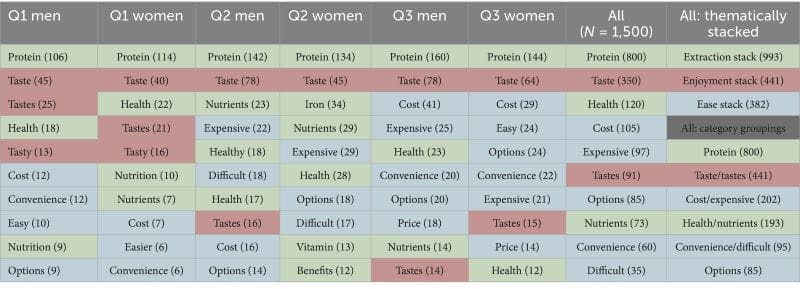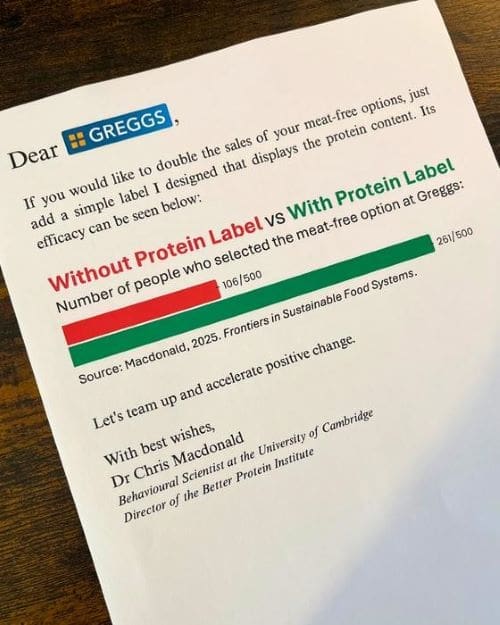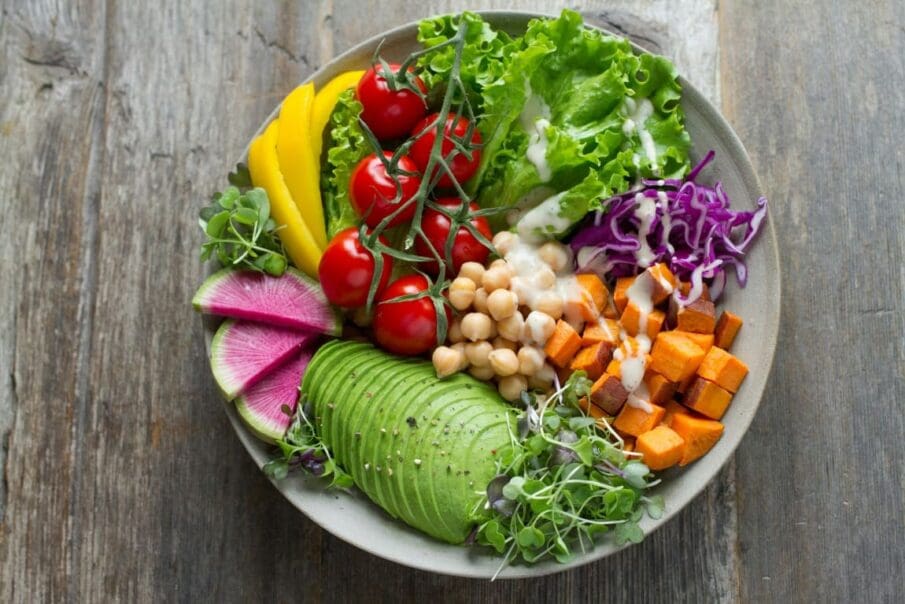Summary:
A study published in Frontiers in Sustainable Food Systems presents a new behavioural strategy that could dramatically increase consumer selection of meat-free foods. Led by Dr Chris Macdonald, Director of the Better Protein Institute at the University of Cambridge, the research introduces a “nudge by proxy” approach that focuses on consumer motivations rather than environmental appeals.
In experiments with 3,000 participants, highlighting the protein content of a meal more than doubled the selection of meat-free options compared to both a control and a carbon-label group. The method emerged from a survey of 1,500 consumers, who identified protein as the main perceived barrier to eating less meat. Dr Macdonald refers to this misconception as the “insufficiency illusion.” As an example, he noted that Greggs’ Vegan Sausage Roll actually contains more protein than its meat-based counterpart.
In an open letter shared with Greggs executives, he invited the company to consider the findings as part of its sustainability efforts. Dr Macdonald says his work “provides a defiant counter-narrative” to the idea that changing consumption habits is too difficult, showing that engaging with consumer motivations can outperform traditional environmental labelling.

Cambridge scientist uncovers cunning way to double the sales of the famous Greggs Vegan Sausage Roll – and in an open letter, shares the technique with key people at Greggs
New research in Frontiers in Sustainable Food Systems reveals a highly effective new strategy to increase low-emission food consumption.
The study, led by Cambridge scientist and Director of the Better Protein Institute, Dr Chris Macdonald, demonstrates that his “nudge by proxy” approach, which calls attention to consumer motivations rather than environmental impacts, more than doubled the selection of meat-free meals in controlled choice experiments with 3,000 participants. This approach proved significantly more effective than traditional carbon footprint labelling.

Dr Macdonald explains: “People often think that their own beliefs and values are more common than they actually are. This is called the false consensus effect. Accordingly, researchers who are also environmentalists might tend towards interventions that highlight negative environmental impacts because it is what influences them, and they may assume that it will be equally persuasive to the average consumer. I call this the environmentalist bias. To avoid this potential bias, prior to designing a new label intervention, I engage directly with consumers.”
The research began with 1,500 consumers who identified protein as the most significant perceived barrier to adopting a meat-free diet. This “insufficiency illusion” – the false belief that meat-free options must lack essential nutrients – emerged as a key insight and informed the creation of a simple protein label. Shocking as it may be to consumers, not only does the Greggs Vegan Sausage Roll come with fewer greenhouse gas emissions and lower fat content, but it also comes with more protein than its meat-based counterpart (this is also the case for their breakfast roll range).
Dr Macdonald notes: “By simply highlighting the protein content, we were able to shift an unprecedented number of consumers towards meat-free choices. As noted in the paper, in the second experiment, the meat-free meal choice was selected by less than a quarter of the participants in the control group and by over half of the participants in the protein label group – a finding consistent for men and women. This increase of more than 100% made the selection of the meat-free item the majority decision and thus marked an unprecedented step-change.”
Dr Macdonald sent the results to Greggs; he published an open letter on social media and sent letters directly to key stakeholders:
- Roisin Currie – CEO
- Paul Irwin-Rhodes – Head of Sustainability
- Hannah Squirrell – Customer & Marketing Director
- Sarah Graham – Product Development & Innovation
- Fiona Mills – Brand Communications & Creative Lead
- Ian White – Head of Brand and Communications.
Dr Chris Macdonald says: “At the Better Protein Institute, we are committed to turning research into tangible impact. In service of this, I have shared the results with Greggs, and I have also offered to collaborate with them, and they have my contact information. They have a unique opportunity to not only increase sales but also cement themselves as leaders in sustainability. The ball is in their court now.”
Dr Macdonald concludes: “A rising tide of global meat consumption fuels an increasingly dangerous narrative: that changing consumption habits is simply too difficult. My work provides a defiant counter-narrative. With a data-driven approach, I continue to uncover new approaches that significantly outperform popular interventions. The secret is simple: returning to first principles, engaging with the consumer, and not acquiescing to external pessimism. Data-driven, defiant optimism in action.”
Journal Reference:
Macdonald C, ‘Reducing meat consumption with consumer insights and the nudge by proxy: the anomaly of asking, the power of protein, and illusions of insufficiency and availability’, Frontiers in Sustainable Food Systems 9: 1656336 (2025). DOI: 10.3389/fsufs.2025.1656336
Article Source:
Press Release/Material by Lucy Cavendish College | University of Cambridge
Featured image credit: Anna Pelzer | Unsplash
Disclaimer:
The use of brand names and/or any mention or listing of specific commercial products or services herein is solely for educational purposes and does not imply endorsement by Muser Press or our partners, nor discrimination against similar brands, products or services not mentioned.




